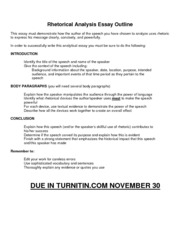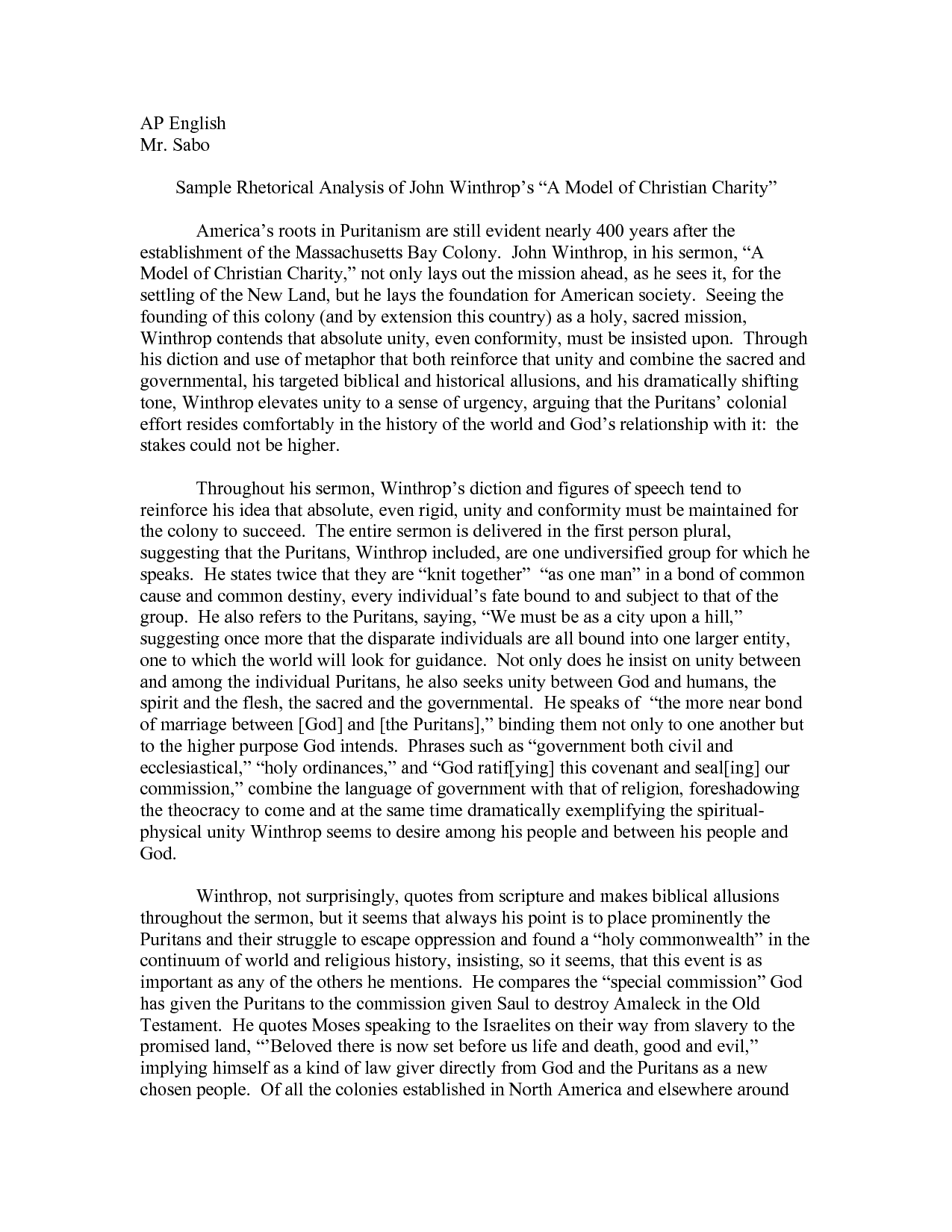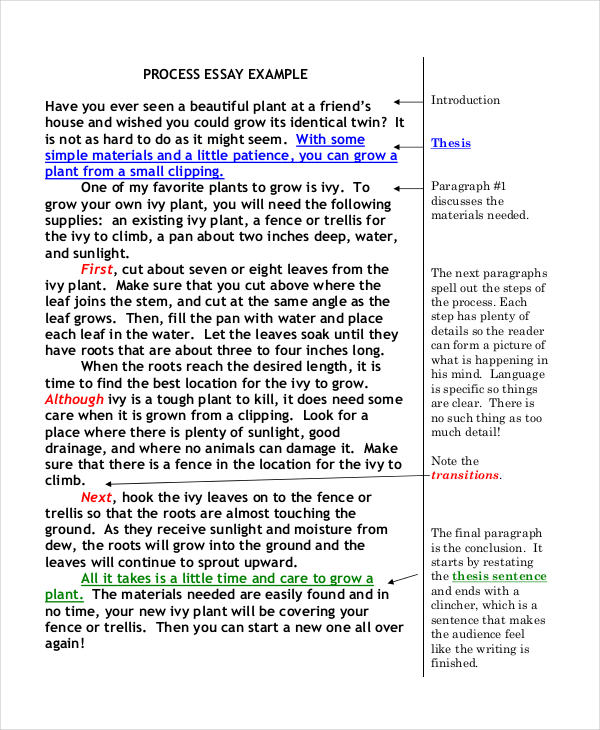
27/01/ · The body is where you will write your analysis; the one you derived from the rhetorical appeals discussed above. According to the basic outline, an essay is divided into introduction background: natural language processing (nlp) is the area of artificial intelligence concerned with teaching computers to interpret text and spoken words in the same manner as 28/08/ · This rhetorical analysis argues that King’s assumption of the prophetic voice, amplified by the historic size of his audience, creates a powerful sense of ethos that has
How to Write a Rhetorical Analysis | Key Concepts & Examples
Published on August 28, by Jack Caulfield. Revised on May 24, A rhetorical analysis is a type of essay that looks at a text in terms of rhetoric. This means it is less concerned with what the author is saying than with how they say it: their goals, techniques, and appeals to the audience. A rhetorical analysis is structured similarly to other essays : an introduction presenting the thesis, a body analyzing the text directly, and a conclusion to wrap up. This article defines some key rhetorical concepts and provides tips on how to write a rhetorical analysis.
Table of contents Key concepts in rhetoric Analyzing the text Introducing your rhetorical analysis The body: Doing the analysis Concluding a rhetorical analysis Frequently asked questions about rhetorical analysis. Rhetoric, the art of effective speaking and writing, rhetorical analysis essay outline, is a subject that trains you to look at texts, arguments and speeches in terms of how they are designed to persuade the audience. This section introduces a few of the key concepts of this field. Appeals are how the author convinces their audience. Three central appeals are rhetorical analysis essay outline in rhetoric, established by the philosopher Aristotle and sometimes called the rhetorical triangle: logos, ethos, and pathos.
Logosor the logical appeal, refers to the use of reasoned argument to persuade. This is the dominant approach in academic writingwhere arguments are built up using reasoning and evidence. Ethosor the ethical appeal, involves the author presenting themselves as an authority on their subject. For example, someone making a moral argument might highlight their own morally admirable behavior; someone speaking about a technical subject might present themselves as an expert by mentioning their qualifications. This might involve speaking in a passionate way, employing vivid imagery, or trying to provoke anger, sympathy, or any other emotional response in the audience.
These three appeals are all treated as integral parts of rhetoric, and a given author may combine all three rhetorical analysis essay outline them to convince their audience. In rhetoric, a text is not necessarily a piece of writing though it may be this. A text is whatever piece of communication you are analyzing. This could be, for example, a speech, an advertisement, rhetorical analysis essay outline, or a satirical image. In these cases, your analysis would focus on more than just language—you might look at visual or sonic elements of the text too. The context is everything surrounding the text: Who is the author or speaker, rhetorical analysis essay outline, designer, etc, rhetorical analysis essay outline. Who is their intended or actual audience?
When and where was the text produced, rhetorical analysis essay outline for what purpose? Looking at the context can help to inform your rhetorical analysis. For example, Martin Luther King, Jr. in a philosophy essay or one that the reader has to infer e. in a satirical article. These arguments are built up with claims, supports, and warrants. A claim is the fact or idea the author wants to convince the reader of. An argument might center on a single claim, or be built up out of many. Claims are usually explicitly stated, but they may also just be implied in some kinds of text. The author uses supports to back up each claim they make.
These might range from hard evidence to emotional appeals—anything that is used to convince the reader to accept a claim, rhetorical analysis essay outline. The warrant is the logic or assumption that connects a support with a claim. Outside of quite formal argumentation, the warrant is often unstated—the author assumes their audience will understand the connection without it. We can see a claim and a support here, but the warrant is implicit. Here, the warrant is the assumption that more likeable candidates would have inspired greater turnout. We might be more or less convinced by the argument depending on whether we think this is a fair assumption. Instead, it starts with looking at the text in detail and asking rhetorical analysis essay outline appropriate questions about how it works:.
See an example. Like all essays, a rhetorical analysis begins with an introduction. Martin Luther King, Jr. Delivered in to thousands of civil rights activists outside the Lincoln Memorial in Washington, D. Each paragraph should focus on a different element of the text, and they should all contribute to your overall argument for your thesis statement. The conclusion of a rhetorical analysis wraps up the essay by restating the main argument and showing how it has been developed by your analysis. It may also try to link the text, and your analysis of it, with broader concerns. By framing contemporary upheavals as part of a prophecy whose fulfillment will result in the better future he imagines, King ensures not only the effectiveness of his words in the moment but their continuing resonance today.
The goal of a rhetorical analysis is to explain the effect a piece of writing or oratory has on its audience, how successful it is, and the devices and appeals it uses to achieve its goals, rhetorical analysis essay outline. For example, you could also treat an advertisement or political cartoon as a text. Pathos appeals to the emotions, trying to make the audience feel angry or sympathetic, for example. Collectively, these three appeals are sometimes called the rhetorical triangle. They are central to rhetorical analysisthough a piece of rhetoric might not necessarily use all of them. In rhetorical analysisa claim is something the author wants the audience to believe.
A support is the evidence or appeal they rhetorical analysis essay outline to convince the reader to believe the claim, rhetorical analysis essay outline. A warrant is the often implicit assumption that links the support with the claim. Caulfield, J. Have a language expert improve your writing. Proofreading Services. Run a free plagiarism check in 10 minutes. Plagiarism Checker. Generate accurate citations for free. Citation Generator. Receive feedback on language, structure and formatting Professional editors proofread and edit your paper by focusing on: Academic style Vague sentences Grammar Style consistency See an example, rhetorical analysis essay outline.
What counts as a text for rhetorical analysis? What are logos, ethos, and pathos? What are claims, supports, and warrants? Is this article helpful? Jack Caulfield Jack is a Brit based in Amsterdam, with an MA in comparative literature. He writes for Scribbr and reads a lot of books in his spare time. Rhetorical analysis essay outline students also liked. It is the most common essay type at university. How to write a literary analysis essay A step-by-step guide Literary analysis means closely studying a text and discussing how meaning is conveyed through things like imagery, tone and perspective.
What is your plagiarism score? Scribbr Plagiarism Checker.
Sample Rhetorical Analysis Essay Video
, time: 9:18How to Write a Rhetorical Analysis Essay: Outline, Steps, & Examples

10/07/ · A rhetorical analysis essay is a serious work that often touches on complex topics. Regular verbs like “tells us” or “shows” don’t always fit it. To make your paper more inclusive 10/07/ · Step #2: Identify Rhetorical Appeals Used in the Text Rhetorical appeals are also known as “modes of persuasion” and include ethos, pathos, and logos. They can be How to Write a Rhetorical Analysis Essay Outline? Introduction Body Paragraph 1 Body Paragraph 2 Body Paragraph 3 Conclusion

No comments:
Post a Comment